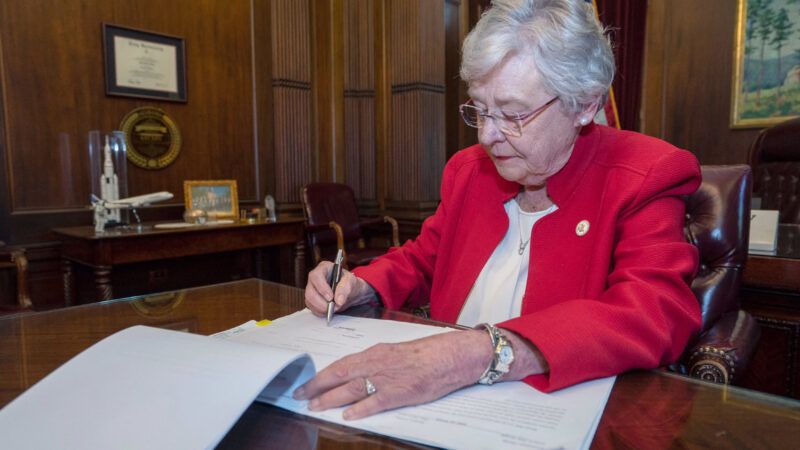Alabama Governor Signs Bill Protecting IVF Treatments
After the Alabama Supreme Court ruled in February that frozen embryos were children, legislators scrambled to protect in vitro fertilization clinics.

Less than a month after the Alabama Supreme Court ruled that frozen embryos created for in vitro fertilization treatment are children, Alabama Gov. Kay Ivey has signed a law protecting access to IVF treatment in the state.
In February, the Alabama Supreme Court handed down a controversial ruling, deciding that frozen embryos would count as children under a 19th-century Alabama wrongful death statute. Justice Tom Parker used extensive quotes from the Bible and Christian theology to justify his decision. "The doctrine of the sanctity of life is rooted in the Sixth Commandment," which prohibits murder, Parker wrote. "All human beings bear the image of God," he continued, "and their lives cannot be destroyed without effacing his glory."
IVF is an infertility treatment involving the fertilization of multiple eggs with the goal of inserting them afterward in a woman's uterus, where they may hopefully implant and grow into a healthy baby. As Reason's Ronald Bailey put it shortly after the ruling was released, "Since the implantation of any specific embryo is far from guaranteed, IVF often involves creating several embryos that are stored in liquid nitrogen that could be made available for later attempts at achieving pregnancy." Parents often have to choose whether to leave their remaining frozen embryos in storage (at a cost) or to have the IVF clinic discard them.
The ruling caused near-immediate chaos, with three IVF providers in the state shutting down operations, citing confusion over the legal implications of the court's decision. The ruling quickly garnered widespread outrage, even among many who are avowedly pro-life.
"We want to make it easier for people to be able to have babies, not…make it harder….And the IVF process is a way of giving life to even more babies," Texas Gov. Greg Abbott told CNN in February. "What I think the goal is is to make sure that we can find a pathway to ensure that parents who otherwise may not have the opportunity to have a child will be able to have access to the IVF process."
Soon after the ruling was handed down, Alabama legislators moved quickly to introduce bills that would protect access to IVF treatment in the state. Senate Bill 159, which Ivey signed Wednesday, ultimately passed with a large bipartisan majority.
"No action, suit, or criminal prosecution for the damage to or death of an embryo shall be brought or maintained against any individual or entity when providing or receiving services related to in vitro fertilization," the bill states. "No criminal prosecution may be brought for the damage to or death of an embryo against the manufacturer of goods used to facilitate the in vitro fertilization process or the transport of stored embryos."
"The overwhelming support of [the bill] from the Alabama Legislature proves what we have been saying: Alabama works to foster a culture of life, and that certainly includes IVF," Ivey said in a statement on March 6. "I am confident that this legislation will provide the assurances our IVF clinics need and will lead them to resume services immediately."
After the bill's signing, two of the three closed clinics announced that they would restart IVF treatments.
Alabama's IVF protection bill will likely assuage fears that access to fertility treatments could be seriously impacted by state-level court rulings. Even in a state where abortion is banned from conception, attacks on IVF remain incredibly unpopular—and stridently pro-life legislators still recognize the importance of safeguarding fertility medicine.


Show Comments (179)